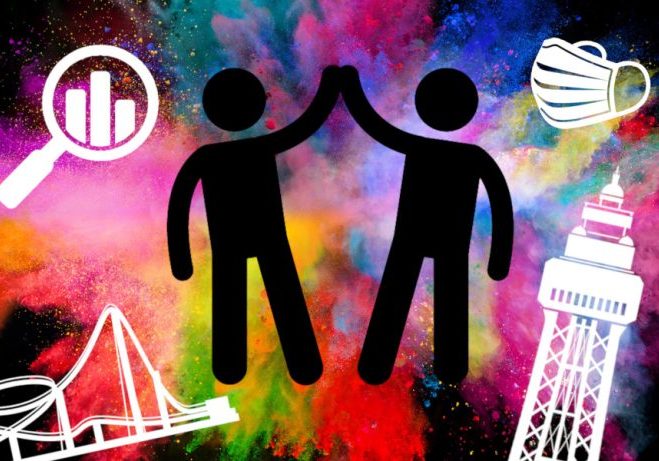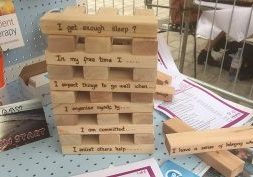By Lindsay, Grace and Kie, all aged 21
We are three young people living in Blackpool, and we have been involved in something really interesting that we would like to share with you. In this blog, we would like to tell you about the wonders of being involved in co-production during a global pandemic, and the impact it has had on our lives.
But first, let’s look at the impact the Covid pandemic has had on young people in general. The Build Back Fairer report explains how Covid has amplified social inequalities that already existed in our society. This is not great news for our home town, Blackpool, which was already one of the most deprived areas in England (Marmot Review 10 Years on, 2020).
For young people this has meant even more challenges. More and more families are using food banks than ever before and child poverty has increased. Youth unemployment has risen faster than for any other age group and there are now even fewer apprenticeship and training opportunities than before the pandemic (Build Back Fairer: Covid-19 Marmot Review, 2020). The closure of schools has impacted on our development, our friendships, and our learning, and lockdown increased the risk of abuse in the home for some young people (EBPU, 2021).
The Covid pandemic has also amplified the pre-existing difficulties in children and young people’s mental health. Every year the Children’s Society publish a ‘Good Childhood Report’ all about the level of life satisfaction the UK’s children and young people have. Every year it shows we are less and less satisfied with our lives. As our life satisfaction goes down, our mental health difficulties go up and it is estimated that 1 in 6 of us now have a diagnosable mental health problem (Good Childhood Report, 2021).
But it’s not all bad news, research shows that many of us young people have been doing okay during the pandemic, indeed it has given us the chance to show how much more resilient we are than a lot of people realised. Like lots of young people, we have had worries about our future, about the safety of our families, about when the pandemic would end and about coming out of lockdown. We do challenge, however, the idea that these worries are a mental health difficulty. We believe our worries and anxieties are a normal response to a very abnormal situation and we should be careful about terming everything as a ‘disorder’.
It is important to say, however, that even though feeling worried and anxious during the pandemic is a completely appropriate response, some of us young people have experienced more challenges during the pandemic than others, and this will have had an even greater impact on our mental health. These are young people who are already disadvantaged in society, including young carers, disabled young people, young people with pre-existing mental health difficulties, young people with special educational needs, young people from black and ethnic minority backgrounds, young people involved in the criminal justice system, care leavers, young people who identify as LGBTQ+, young people living in poverty, and young people experiencing domestic violence and abuse (EBDU, 2021).
We are three young people who identify with a number of these disadvantages – between us we are young carers, physically disabled, have pre-existing mental health difficulties and live close to the poverty line. Angie, from Boingboing, has written about this in her book ‘Resilient Therapy’ (Hart, et al, 2007), she says some people experience ‘constellated disadvantage’. This means we often don’t just experience one disadvantage, but we can experience lots of different disadvantages at the same time. During the pandemic we have experienced cancelled hospital appointments, increased isolation due to either us or our immediate family shielding, we have struggled to access support services that were usually available to us, and we have been hit financially due to a lack of work opportunities.
So overall, the odds were quite against us during the Covid pandemic, and we were worried about the impact this would have on our mental health, as well as worried about not being able to access our traditional mental health support services (which were already pretty inaccessible). But do you know what? We all did ok in the end. We did ok because we became involved in co-production, a great way to prevent poor mental health and build our resilience, whilst also making bigger changes for other young people. The co-production group we were involved in was part of the Resilience Revolution, a social movement aiming to build the resilience of children and young people’s across the town of Blackpool. Grace, one of the authors of this blog, will tell you more:
I feel like lockdown for me was like “preparing to perform for a live show”, as though the outside world was a new stage, a new scene and a new audience. I have severe anxiety and I have my stages of depression too. Covid was really worrying and it was so upsetting to see the impact it had on everyone, and when we first went into lockdown my mind was muddled and I was trying my best to un-muddle it. As a young person with anxiety, being inside made me feel at ease and comfortable but I had a feeling of loneliness too.
After months of attending on-line co-production meetings, I had the answer to my question “what is co-production?” – It’s when practitioners, organisations, and service users come together to make change, sharing power, skills and experience. It felt so welcoming and it was lovely to have different perspectives and ideas, and there was no hierarchy, we were all treated as equal and everyone’s voice was heard – isn’t that just great?
A REALLY important part of co-production is teamwork, as we all needed to work together and value the different skills that others bring to the group; everyone is individual and can contribute in their own ways. I was able to work with a team of amazing people from all walks of life. We were a real mixture of people – young people, parents and carers, and mental health professionals. It really was fascinating.
By now you’re probably wondering what the aim of our co-production group was? Well, it was to create self-help information packs to improve the resilience and wellbeing of young people and families in Blackpool. The Co-production group was set up because young people and families have said that they would like to know how they can support themselves; how to support friends and family and also know what support is available in the local area and online. So as a group we got together to make a difference.
We have created two amazing information packs titled ‘ReMiT’ (Resilient Minds Toolkit), one for young people, and one for parents and carers. In the toolkits we introduce the Resilience Framework – this is a handy table of ideas that helps us build resilience for when times are tough. We also give ideas and strategies which can support positive mental health. We have a ‘Top Tips’ section in the parent/carer ReMiT, giving helpful hints and tips to support your children mental health; and a ‘frequently asked question’ section in the young person’s ReMiT, giving guidance on supporting your friends with their mental health. We hope we have replicated the peer support we got from being involved in this co-production project in the ReMiT guides. ReMiT also has recommended websites, apps, books and information about local services.
It gave me something to focus on during the pandemic and my mind wasn’t muddled anymore – I had a purpose. I feel like I am finally making a difference in the world, it feels good to be involved in making a change and I feel proud of these achievements. I still get anxious and still feel scared about “preparing to perform for a live show”, but now… I am ready to perform.
If you’re familiar with the Resilience Framework you will see that Grace has made lots of resilient moves by being involved in co-production – she has felt like she belonged, made good relationships, learnt new skills, organised herself, found time for her interests, instilled a sense of hope and achieved many more resilient moves. So, even though lots and lots of young people have been trying to access mental health support since the pandemic (A time of reckoning for children and young people’s mental health – NHS Providers), that does not include any of us. In fact, our mental health has been pretty robust lately, thanks to the wonders of co-production.
The Resilient Minds Toolkits that we have written will hopefully support lots of other young people and parents/carers. You can download your free copy here ReMiT: Resilient Minds Toolkit – Boingboing.

